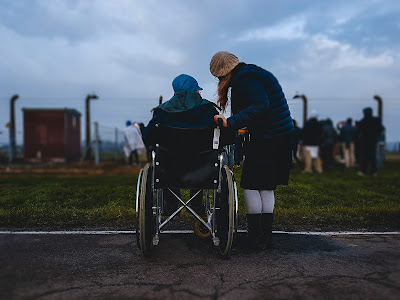By Laiba Farooq Though it was winter, the picturesque landscape numbed the spell of harsh weather. The panoramic view across Damn-e-Koh cann...
By Laiba Farooq
Though it was winter, the picturesque landscape numbed the spell of harsh weather. The panoramic view across Damn-e-Koh cannot be absorbed in a single glance. The sun was about to set, but the puffy clouds made it hard to witness. Nevertheless, it could not undermine the might of lush green Margalla Hills around and the view of the city below. Serenity is what dominated that place. It seemed a fortunate escape from the hustle and bustle of city life. This place mesmerized me to such an extent that the idea of going back home appeared a villain to me.
I was already spellbound by this beauty and could not wish for more. But, what I witnessed next left me awestruck in no time. There was a father helping her two disabled daughters walk up the stone stairs. He was laughing with them, showing them the places around and enjoying themselves. The view seemed complete. They seemed like an ideal family. But… the people…
They were staring. There were sighs around the manifestation of contentment rarely observed.
Whatsoever, that man was unconcerned about that unjustified melancholy. He had already mustered up the courage to live in a society that can embrace every moral shortcoming but not physical disabilities; that questions the existence of a disabled person but remains quiet in front of social evil. I realized how much such people are shackled not by their disabilities but by society.
It is extremely inspiring that even knowing the mindsets of society, the father didn’t compromise on the happiness of his children. He didn’t let society’s prejudice overshadow his innocent daughters. Why can we never understand that they are not in the need of sympathy? Though the beauty of the father’s act ascended the enchantment of Damn-e-Koh, however, in his story and the story of his daughters what role the society played will always remain a sombre question.
Persistent sighing words and discouragements are what surround them day and night; “Oh dear! This must be hard. Isn’t it?” “Where are you going with these lifeless legs?” “I wanted you to be there but I was afraid of what people would say.” It is awful that seeing them we remember Allah and seek forgiveness so aloud that they begin to hide from their own selves. What kind of forgiveness is this where we forget that we are committing the sin of breaking innocent hearts and making them feel inferior? This is Allah who creates and He creates everything in its best form. It means that we are so narrow-minded that we cannot see the real beauty. Regrettably, most of our society considers them as a sign of Allah’s wrath. We might not be among those who mock them at the things which they can’t change. But surely we are among those who isolate them and discount their self-worth. We assume them as unworthy of any companionship or social interaction. Their physical disabilities don’t mean they are dead; they have no hearts to feel. This discrimination gradually pushes them into the pit of darkness.
Imagine yourself suffering from any impairment. It’s hard to think. Now, add something to this situation; think of yourself being held back from achieving your dreams and asked to remain within four walls because there is no one outside who can accept you. Even just thinking about it is heart-wrenching so what about those who go through this trauma daily?
The list of “unfit” people doesn’t end there. People with burnt faces, deaf, blind, etc. also share stories similar to them. We believe in the mortal nature of everything in this universe. However, the pathetic atmosphere we as a society create, reveals our materialistic approach. We do not realize them as equally valuable in the prosperity of the country. Consequently, they are held back from educational institutions and opportunities available to common people. Besides, they are welcomed with difficulties rarely observed by common people.
It is a dire need of the hour to accept them as who they are; to make them feel good and whole about themselves; to let them have the freedom of expression. We don’t have to pity them because of their hardships. They can overcome most of them anyway and can cope with them. Although the struggle of self-acceptance and realization of self-worth is individual, we, as a society, should try our best to not make them feel any less than others and clip their wings when they are determined to commence their first flight. Just as the saying goes:
“When the glass is half empty, always remember that the glass is half full.”
Let’s not lose sight of the half part that is full. Let’s talk with them about their dreams, not disabilities. Let’s surround them with positivity and make them believe that they can.





.png)